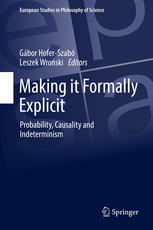

Most ebook files are in PDF format, so you can easily read them using various software such as Foxit Reader or directly on the Google Chrome browser.
Some ebook files are released by publishers in other formats such as .awz, .mobi, .epub, .fb2, etc. You may need to install specific software to read these formats on mobile/PC, such as Calibre.
Please read the tutorial at this link: https://ebookbell.com/faq
We offer FREE conversion to the popular formats you request; however, this may take some time. Therefore, right after payment, please email us, and we will try to provide the service as quickly as possible.
For some exceptional file formats or broken links (if any), please refrain from opening any disputes. Instead, email us first, and we will try to assist within a maximum of 6 hours.
EbookBell Team

0.0
0 reviewsThis book collects research papers on the philosophical foundations of probability, causality, spacetime and quantum theory. The papers are related to talks presented in six subsequent workshops organized by The Budapest-Kraków Research Group on Probability, Causality and Determinism.
Coverage consists of three parts. Part I focuses on the notion of probability from a general philosophical and formal epistemological perspective. Part II applies probabilistic considerations to address causal questions in the foundations of quantum mechanics. Part III investigates the question of indeterminism in spacetime theories. It also explores some related questions, such as decidability and observation.
The contributing authors are all philosophers of science with a strong background in mathematics or physics. They believe that paying attention to the finer formal details often helps avoiding pitfalls that exacerbate the philosophical problems that are in the center of focus of contemporary research.
The papers presented here help make explicit the mathematical-structural assumptions that underlie key philosophical argumentations. This formally rigorous and conceptually precise approach will appeal to researchers and philosophers as well as mathematicians and statisticians.